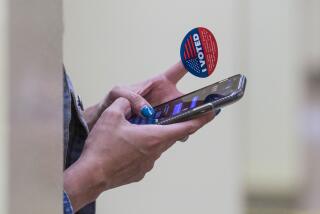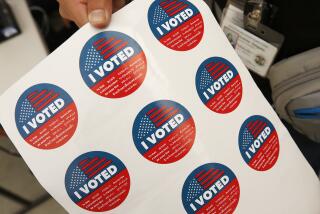When in Iraq, Do as the Grand Ayatollah Does
- Share via
BETHLEHEM, Pa. — The United States is enmeshed in a friendly yet urgent debate with a Shiite cleric over the future of Iraq, and last week the Bush administration scored an important point. But if a stable Iraq is our goal, Grand Ayatollah Ali Sistani had better win the argument. He insists on direct elections, as opposed to Washington’s caucuses, to determine the next Iraqi government.
There are four reasons why Sistani is right.
Direct elections are far more democratic than caucuses. Indeed, Sistani embraces a principle central to democracy in general, and the U.S. version in particular. His earlier demand for elections to be held by July 1 was impractical. The security situation is too unsettled, there are no electoral rolls, and agreement among Shiites, Sunnis and Kurds on the Fundamental Law, or interim constitution, has yet to be achieved. U.N. special envoy Lakhdar Brahimi said as much when he reported to Secretary-General Kofi Annan that the most realistic date for elections would be late this year or early next. Sistani said he would abide by the U.N.’s judgment, and last week he said elections could slip to December or January, but no later. That signaled his tacit acceptance of the U.S. plan to create an interim government through caucuses. It’s now up to the administration to make a deal that would give Sistani direct elections.
Second, a Sistani victory would send a powerful message to all Iraqis and people of the region: It is possible to have a nonviolent argument with the U.S. and win. That would be a sharp rebuff to those who have mobilized to fight Washington with violence and terrorism. Although the U.S. is unlikely to be defeated by remnants of the Baath Party, a deal with Sistani would demonstrate that it’s possible to outfox the U.S. by seizing the moral high ground and employing peaceful means.
Third, any direct elections following a U.S.-Sistani deal would be more legitimate and acceptable to Iraqis and to the region as a whole. Anyone elected or selected by U.S.-imposed caucuses would be seen as suspect. Sistani, by contrast, enjoys a veneer of legitimacy. His refusal to meet with anyone from the Coalition Provisional Authority has left him untainted in Iraqi eyes by any collaboration with the Americans. Yet he supported Saddam Hussein’s overthrow because he and his followers were among the primary beneficiaries of the tyrant’s exit. As a result, Sistani is in a position to lead Iraqis to democracy, rather than the U.S. imposing it on them.
Finally, for an administration determined to bring democracy to the Middle East through regime change in Iraq, Sistani offers a lesson. The reverberations are already evident. About 400 Iranian intellectuals, artists and political figures recently appealed to Sistani to intervene in Iran’s electoral dispute between conservatives and reformers. They were inspired by his “courageous” call for “free, fair and direct elections” in Iraq.
We shouldn’t delude ourselves into thinking Iraqi democracy is just around the corner. Sistani knows the U.S. presence in Iraq is necessary to the future. Although seeming uncooperative, he has been careful to control his followers and discourage them from rampaging in the streets in support of his demands. The U.S. must make sure he doesn’t change tactics. Sunnis and Kurds are terrified that Sistani’s call for direct elections is nothing but a ploy to ensure Shiite domination in Iraqi politics.
The Bush administration has no choice but to seek a compromise with Sistani, because it has lost the caucus argument in Iraq. But from purely narrow electoral calculations -- after all, the administration picked June 30 for the transfer of power for political reasons -- postponing Iraqi elections until after the U.S. presidential election may enable President Bush to stave off criticism of his Iraq policies during the campaign. Sistani has offered as much. All that’s left is to define the terms of transition in June and pick a date for Iraqi elections.
More to Read
Sign up for Essential California
The most important California stories and recommendations in your inbox every morning.
You may occasionally receive promotional content from the Los Angeles Times.













